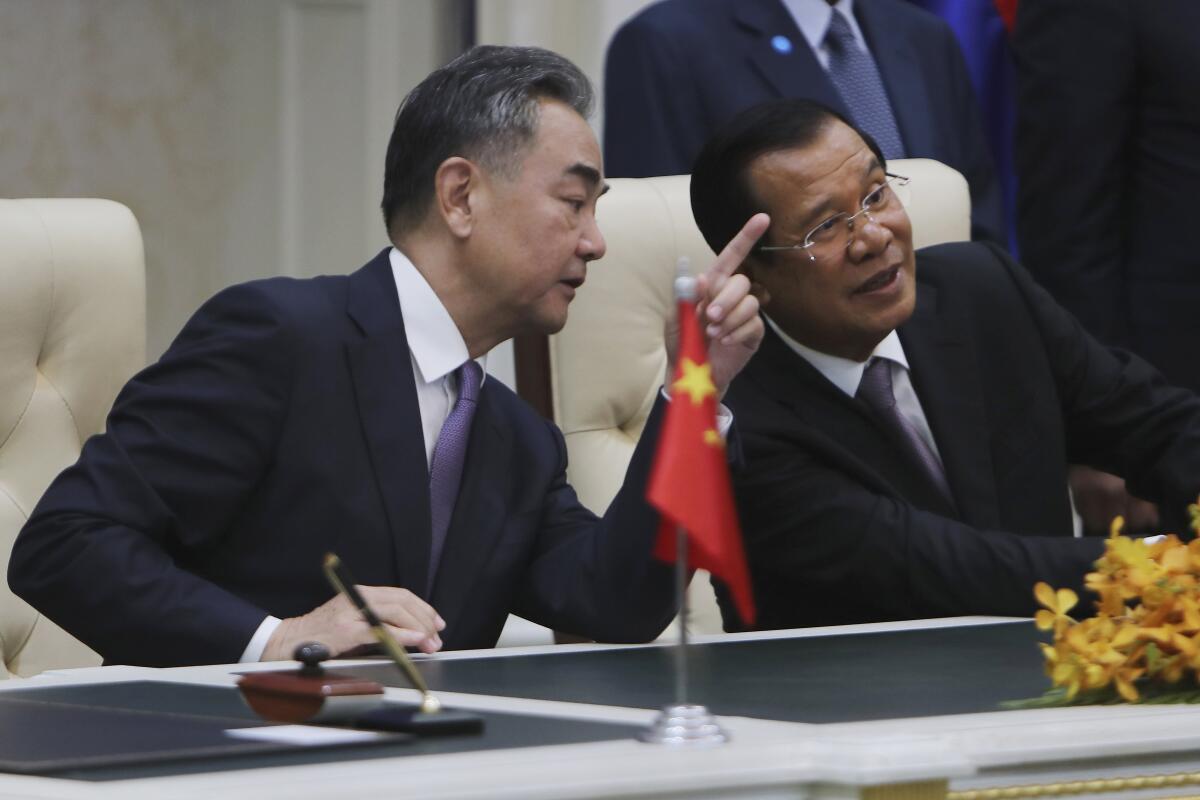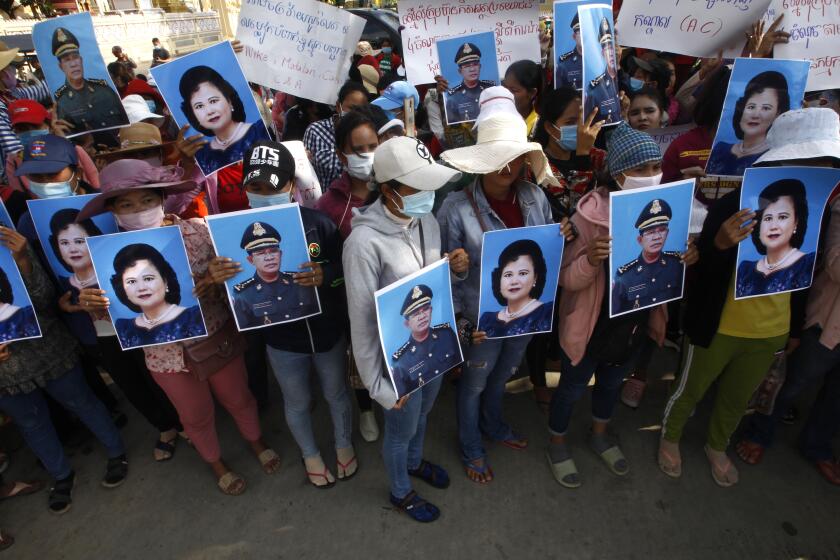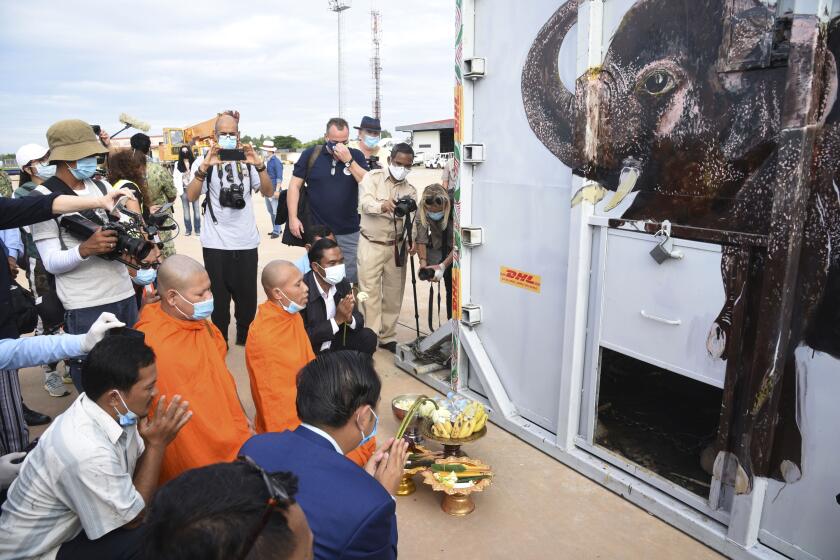U.S. slaps an arms embargo on Cambodia, citing deepening Chinese influence there

- Share via
BANGKOK, Thailand — The U.S. has ordered an arms embargo on Cambodia, citing deepening Chinese military influence, corruption and human rights abuses by the government and armed forces in the Southeast Asian country.
The added restrictions on sales of defense-related goods and services, issued by the State and Commerce departments, are due to be published and take effect Thursday.
A notice in the Federal Register said developments in Cambodia were “contrary to U.S. national security and foreign policy interests.”
The aim of the embargo is to ensure that defense-related items are not available to Cambodia’s military and military intelligence services without advance review by the U.S. government, it said.
The latest restrictions follow the Treasury Department’s ordering in November of sanctions against two senior Cambodian military officials for corruption and come amid increasing concern about Beijing’s sway.
At the time, the U.S. issued an advisory cautioning American businesses about potential exposure to entities in Cambodia, including its military, that “engage in human rights abuses, corruption and other destabilizing conduct.”
Linath Lim fled the brutal Khmer Rouge regime and became a doctor in Fresno. Amid the pandemic, she treated farmworkers and the poor, until the virus caught up with her.
Cambodia branded those sanctions as “politically motivated” and said it would not discuss them with Washington.
The U.S. has imposed similar controls on exports of items that might be diverted to “military end users” in Myanmar, China, Russia and Venezuela.
U.S. exports to Cambodia in 2019 totaled $5.6 billion. The amount of military-related exports was not immediately available. The U.S. is the largest export market for Cambodia, a major garments manufacturing hub, but three-quarters of Cambodia’s imports are from China and other countries in Asia.
The U.S. halted military assistance to Cambodia following a 1997 coup in which the country’s leader, Hun Sen, grabbed full power after ousting his co-premier, Prince Norodom Ranariddh. Hun Sen remains prime minister. In August 2005, President George W. Bush waived the ban, citing Phnom Penh’s agreement to exempt Americans in Cambodia from prosecution by the Netherlands-based International Criminal Court.
Millions are at risk of defaulting on loans as the coronavirus pandemic halts Cambodia’s recovery from decades of war and poverty.
Since direct military ties between the two countries were restored in 2006, the U.S. has pledged millions in military aid to Cambodia, initially to help improve its border security and peacekeeping operations.
China is Cambodia’s biggest investor and closest political partner. It was the chief backer of the murderous regime of Pol Pot in the 1970s and has long maintained strong relations with Hun Sen, who has ruled for more than 30 years and grown increasingly repressive.
Beijing’s support allows Cambodia to disregard Western concerns about its poor record on human and political rights, and in turn Cambodia generally supports Beijing’s geopolitical positions on issues such as its territorial claims in the South China Sea.
The construction of new Chinese military facilities at Cambodia’s Ream Naval Base is a point of strong contention with Washington.
The pachyderm dubbed the ‘world’s loneliest elephant’ after languishing alone in a Pakistani zoo has arrived safely in Cambodia, with Cher’s help.
Ream faces the Gulf of Thailand, adjacent to the South China Sea, where China has aggressively asserted its claim to virtually the entire strategic waterway. The U.S. has refused to recognize China’s sweeping claims, and the Navy’s 7th Fleet routinely sails past Chinese-held islands in what it terms freedom-of-navigation operations.
In recent years, Hun Sen’s government has cracked down on the political opposition, shut media outlets and forced hundreds of Cambodian politicians, human rights activists and journalists into exile.
Human rights groups say the government has engaged in arbitrary arrests and other abuses and worked to portray peaceful dissent over corruption, land rights and other issues as attempts to overthrow the government.
Corruption is another major concern.
Start your day right
Sign up for Essential California for the L.A. Times biggest news, features and recommendations in your inbox six days a week.
You may occasionally receive promotional content from the Los Angeles Times.
The Treasury Department’s sanctions ordered last month target the director general of the defense ministry’s material and technical services department and a commander in the Cambodian navy.
In a statement, the Treasury Department alleged that in 2020 and 2021, the two conspired with other Cambodian officials to inflate costs of a construction project at the Ream base and then planned to use the funds for their own benefit.
Washington has protested over work done at Ream, which officials said involved the demolition of two U.S.-funded buildings without notification or explanation to the U.S.
More to Read
Sign up for Essential California
The most important California stories and recommendations in your inbox every morning.
You may occasionally receive promotional content from the Los Angeles Times.















